
The Many Shades Of Grey – December 2017, Canadian Packaging
By Andrew Joseph, Features Editor; Photos by Cole Garside
Automation Food Safety General Coding & Labeling Brunner GmbH u. Co.Kg Canadian Food Inspection Agency Cascades Inc. Celplast Packaging Systems Ltd. CFIA Gray Ridge Eggs Inc. Harlund Industries Ltd. Hartman North America Hitachi America Kraus Maschinenbau GmbH Kuhl Corp. Moba USA Polar Pak Inc. Safe Quality Food Institute SEW-EURODRIVE Canada slideshow SQF Level 2 Yaskawa Motoman CanadaOntario egg processor happy to put all its eggs in one basket to meet its unique product coding and marking requirements.
Cutline: Harlund Industries Eastern Canada branch manager Wade Lunn (left) and Gray Ridge executive vice-president operations Scott Brookshaw examine the final print quality of the Hitachi RX2-S inkjet coders used en masse by the egg processor at its 105,000-square-foot processing facility in Listowel, Ont.
There are many good reasons why putting all your eggs in one basket may not be the most sound business model most of the time. But not all eggs, and not all baskets for that matter, are created equal.
For Strathroy, Ont.-headquartered processor Gray Ridge Eggs Inc., the evolution of egg harvesting and packaging has been a remarkable journey.
Founded in Ridgetown, Ont., in 1934 by Lyle and Ina Gray, parents of the company’s current chief executive officer and owner Bill Gray, the family-owned enterprise started out by supplying the local market dominated by standard white eggs with the brown-shelled eggs laid by unique varieties of chicken bread for this very purpose.
“Brown chickens like the Isa Brown and Lohman Brown lay brown-shelled eggs, while white chickens such as the White Leghorn lay white eggs,” Gray Ridge Eggs executive vice-president of operations Scott Brookshaw told Canadian Packaging magazine during a visit to the company’s 105,000-square-foot egg processing and packaging facility in Listowel, Ont., which has recently undergone a series of extensive capital improvement projects and expansions to boost its capacity and competitiveness.
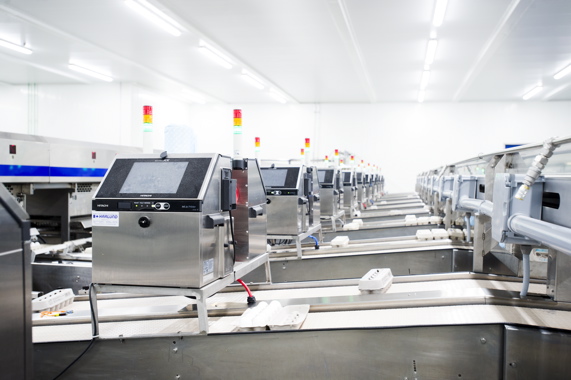
The Gray Ridge Eggs facility in Listowel employs 55 Hitachi RX2-S inkjet coders purchased from Harlund Industries.
Started in 2016, the multiphase expansion provided the Listowel facility with an additional 25,000 square feet of space for processing and another 25,000 square feet of space in the packaging areas of the plant, says Brookshaw, citing the founder Bill Gray’s mantra of, “Keep growing, keep building and operate as if you will go on forever.”
As Brookshaw explains, “The expansion was initiated when we found ourselves not only running at full capacity, but also having to run weekend shifts to meet the uptick in product demand.
“It was very difficult on our labor force,” says Brookshaw, “and so we chose to expand the plant to ease the burden on our employees, as well as to become more efficient.”
According to Brookshaw, Gray Ridge nowadays offers about 80 different SKUs (stock-keeping units) of fresh eggs and processed egg products, serving all the major grocers across the province of Ontario.
“We provide a very extensive range of egg type and packaging,” says Brookshaw citing many varieties “developed by the global industry as a whole to suite changing consumer lifestyles.
“We call it ‘delivering lifestyle choices’,” he continues, adding that the company serves every major grocery retailer in Ontario, pointing to the company’s wide selection of egg products such as:
- The Enriched Coop (eggs laid by hens in an enriched hen coop;
- The Golden D eggs, each containing 50 per cent of daily recommended intake value of Vitamin D);
- The Double Yolks variety, in which 75 per cent of the eggs in the pack will contain a double yolk);
- The Premium range of eggs collected from peak of laying cycle, featuring stronger shells and firmer yolks);
- Conestoga Farm Brands, where the eggs are from free-run hens, available in both brown and white eggs;
- Regular all-purpose eggs, eggs containing Omega-3 and other anti-oxidants, eggs laid by free-range birds, eggs from chickens raised on an all-grain organic diet, and some further-processed egg products such as cartons of egg whites.
This growing product variety and diversification naturally makes the Listowel plant, along with its sister operation in Strathroy, a very busy nest of activity.
“We receive 220,000 dozen eggs, that’s 2,640,000 eggs, into our Listowel facility every day,” Brookshaw states, “after which they are all processed, packaged, and shipped to our customers within three to five days.”
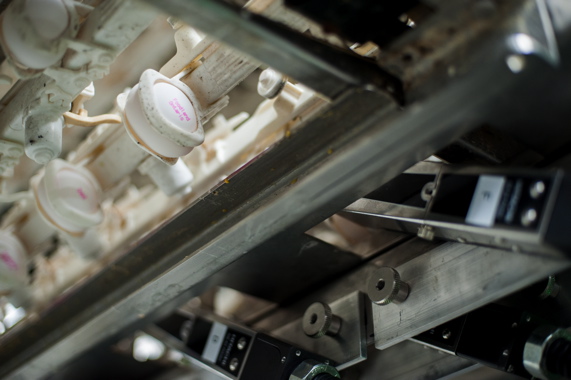
A close-up of Hitachi RX2-S inkjet coders applying the Foodland Ontario marketing logo onto the eggshell.
According to Brookshaw, the company operates poultry farms near Listowel and Strathroy, and also buys eggs from other Ontario-based farmers to maintain steady supply for the two plants, each accounting for roughly a half of the company’s total output.
Maintaining a strict HACCP (hazard analysis and critical control points) protocol for food safety, both plants boast Safe Quality Foods’ SQF Level 2 food safety certification of the international Safe Quality Food Institute. The facilities are also FSEP (Food Safety Enhanced Program)-approved grading stations from the CFIA (Canadian Food Inspection Agency), along with membership in the marketing alliance that markets the GoldEgg/JauneDoré specialty eggs and egg products nationally.
“The Gray Ridge facilities are very automated egg processing plants,” notes Brookshaw, “with the latest and technologically-sound equipment and machinery around.
“We even have a computerized order-picking system that will only print an invoice if the order has been correctly picked by our employee,” says Brookshaw, citing recent installation of cutting-edge equipment that includes:
- a Kraus Joker friction feeder that lays a paper featuring branding atop a tray of 30 eggs for a large grocery chain;
- a BVM Compacta Genius Servo plastic overwrapper and heat tunnel from Celplast Packaging Systems Ltd.;
Suppliers include: Cascades Inc. and its Ultracell eggflat trays; Hartman North America fiber egg cartons; and Polar Pak clear plastic egg cartons.
To move its eggs in and out of the plant, the company deploys a fleet of 33 tractors and 48 refrigerated 53-trailer trucks—each carrying 32 skids with 900 dozen eggs per skid, or 345,600 eggs per truck in total.
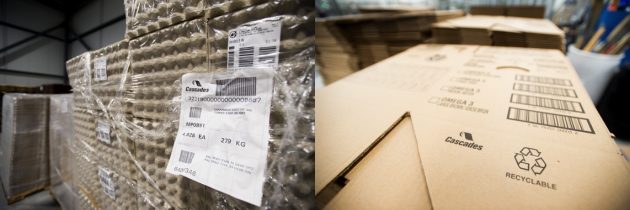
Paper packaging products giant Cascades supplies Gray Ridge Eggs with its molded-fiber egg trays and corrugated cartons.
After logging in the number of eggs taken from each farm—all packed in different-colored plastic trays—the eggs are graded and forwarded toward packaging, while plastic trays and plastic pallets are run through a pair of ISD-Model 2 tray-washing lines and one P101MC-8-15 pallet-washing line.
Manufactured by Kuhl Corp., each of the tray-washing stations hygienically cleans about 7,000 trays per hour.
Upon its arrival, the eggs pass through a multitasking Moba system comprising a Moba FL 500 loader, a Kuhl washer/dryer, and a Moba 500 grader machine that has the capacity to run 15,000 dozen or 180,000 eggs per hour—cleaning and sorting them based on weight, while removing any imperfect eggs automatically.
“From the moment the eggs enter our facility,” says Brookshaw, “there is no need for human hands to touch them.”
From there, the trays of eggs are transferred onto one of the 22 packaging lines housed at the plant via smooth-running conveyors, powered by SEW-EURODRIVE motors.
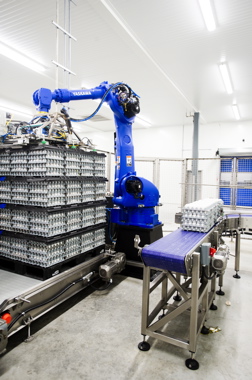
With a delicate touch belying its size, a Yaskawa six-axis robotic palletizer with a DX200 MH180 controler takes baskets of eggs and stacks them five-levels high onto a plastic shipping pallet.
As a sign of Gray Ridge’s commitment to supporting local Ontario farmers and providing Ontario families with quality, local, Ontario eggs, all Gray Ridge eggs produced in the province are certified ‘Ontario local’ by Foodland Ontario.
Each Ontario egg is stamped Foodland Ontario and each carton—whether it be Gray Ridge, GoldEgg or Conestoga Farms branded—proudly sports the famous Foodland Ontario logo.
The eggs are marked via one of the many Hitachi inkjet coders purchased by Gray Ridge en masse from Hitachi’s Canadian distributor, Harlund Industries Ltd. of Edmonton, AB with service from its Mississauga, Ont. facility.
The Listowel plant has a total of 55 Hitachi RX2-S inkjet coders at its disposal, Brookshaw relates, with another 40 RX2-S units employed at the Strathroy plant.
In applying the Foodland Ontario logo to all eggs that go to wholesale customers, each egg is marked using the food-grade Hitachi JP-E78 pink ink, the coders are also used to apply additional marks, codes or text on the specialty products, such as the word Omega for the Omega-3 brand, using Hitachi’s JP-K112 black ink.
“We also apply all the pertinent lot code data and best-before dates onto each and every carton of eggs we pack,” says Brookshaw, adding that the ethanol-based inks used by the Hitachi coders are perfectly safe for this application.
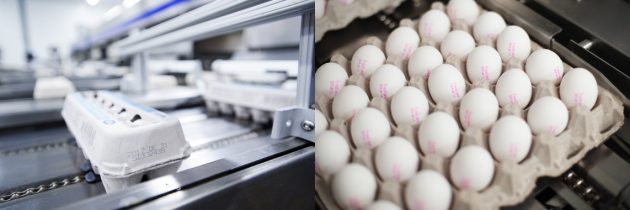
Along with applying best-before dates and lotcode data to fiber egg cartons, the Hitachi RX2-S inkjet coders are also used to apply a Foodland Ontario marketing logo onto each individual egg (right) to confirm their local product origins.
According to Brookshaw, the company’s relationship with Harlund Industries, which markets industrial inkjet printers/coders, laser printers/coders, and label printing and application systems from strategically-located branches across Canada—traces back to about five years ago.
“They came to us prospecting after seeing one of our trucks on the highway,” Brookshaw recalls.
“We liked the fact that they have been very easy to deal with from the get-go,” he says, “and that they also had excellent references.
“So we set up some tests using our eggs and their coders, performed magnificently.”
As Brookshaw relates, he was highly impressed with the robust throughout speeds of the Hitachi RX2-S coders, along with their ease of cleaning.
“The biggest problem for any printer in a facility utilizing fiber carton packaging is the cleaning part of it,” explains Brookshaw, noting that about 90 per cent of cartons and trays used to pack eggs at the Listowel plant are fiber-based.
“The fibers end up clogging the printheads,” he explains, “and it can be a slow and laborious task to clean them out.
“But we don’t have that issue with the Hitachi heads.”
Says Brookshaw: “The last thing I want from a packaging point of view is for my printers to cause any production downtime, but thanks to the RX2-S coders’ highly corrosion-resistant stainless-steel body and all-aluminum printheads, we don’t have that problem.”
It now never takes more than 15 minutes to have a clogged printhead back online and humming again, according to Brookshaw.
“These industrial-strength printers are very functional and they provide a big boon to our maintenance personnel by requiring virtually no effort to clean, while helping us avoid the lengthy downtimes that we endured previously,” he says.
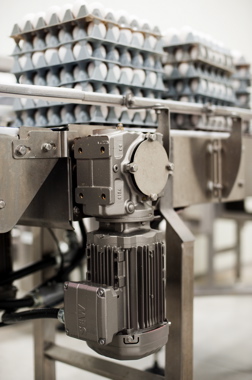
Conveyor lines at the Listowel facility use SEW-EURODRIVE motors to ensure smooth and efficient product transfer.
The Hitachi RX2-S coders are part of the company’s high-quality series of industrial small-character high-speed printers that apply inks via a noncontact method by blowing it onto the rounded eggshell surface, in this case, as well as onto various other substrates such as metals, plastics, rubbers, films and papers.
Easy to use, the print message layout is displayed on the touchscreen interface, with function buttons displayed as icons to better assist the operator understand the button feature.
Along with the ease-of-cleaning, the printer filter assemblies can be easily accessed in the circulation cabinet front panel and replaced without use of any tools.
Moreover, the coder’s thoughtful design provides easy access to circulation and electrical cabinets to allowing for more efficient, time-saving field installations and routine preventive maintenance.
“As an added bonus, the Hitachi RX2-S only uses about half as much solvent as conventional printers, saving us considerable expense,” Brookshaw adds.
“All in all, the Hitachi RX2-S printers we purchased from Harlund Industries have provided us with a real peace-of-mind—allowing us to focus on other areas of the egg production business.
“Whenever I call Harlund Industries, they answer quickly,” Brookshaw adds.
“They are always professional and polite, and I always finish our call satisfied that I have received quality customer support,” he concludes.
“Without a doubt, they will continue to play an important role going forward in our company’s continued growth and success in the marketplace.”
Advertisement

